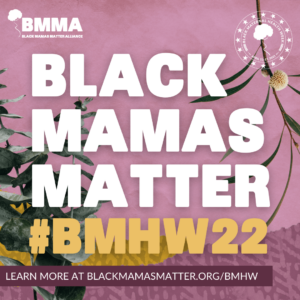 Each year approximately 700 women die in the United States as a result of pregnancy or related complications, and Black women are more than three times more likely to die in childbirth than White women. Each year, the Black Mamas Matter Alliance sponsors a Black Maternal Health week (BMHW) on April 11-17.
Each year approximately 700 women die in the United States as a result of pregnancy or related complications, and Black women are more than three times more likely to die in childbirth than White women. Each year, the Black Mamas Matter Alliance sponsors a Black Maternal Health week (BMHW) on April 11-17.
In 2021, President Biden signed a proclamation recognizing BMHW and the importance of addressing the crisis of Black maternal mortality and morbidity in this country. The proclamation states the Biden Administration is committed to pursuing systemic policies, like addressing social determinants of health to reduce maternal mortality.
The National Academy for State Health Policy (NASHP) currently operates a state policy academy to support states in improving maternal health outcomes, with a specific focus on reducing racial disparities in maternal mortality. The following are examples of actions states are taking to reduce maternal mortality among Black women:
- Maternal Mortality Review Committees (MMRC). Review of maternal deaths is vital to inform prevention efforts. Nearly all states have an MMRC, but Committees differ by membership, scope of work and recommendations. Examining deaths by race and ethnicity through a full year postpartum can also help identify drivers of maternal mortality disparities. For example, a review of 14 Maternal Mortality Review Committee reports found that the leading cause of death for non-Hispanic White women was behavioral health conditions (including mental health, substance use disorder and overdose) while the leading cause for non-Hispanic Black women was cardiovascular-related conditions. Understanding the root causes of these deaths can inform recommendations to reduce disparities.
- Postpartum Coverage Extension in Medicaid. Some states are pursuing options to extend coverage to 12 months postpartum for pregnant people. Section 9812 of the American Rescue Plan Act provides states the opportunity for continuous Medicaid coverage through 12 months postpartum. As Medicaid pays for 65 percent of births for Black women, extending Medicaid coverage has the ability to greatly improve health outcomes and reduce racial disparities.
- Medicaid Coverage of Doula Services. Doulas provide culturally congruent physical, psychological and emotional care over the perinatal period and can make important connections to care and social services in communities. Currently four states (Minnesota, New Jersey, Oregon and Virginia) reimburse doulas as an optional Medicaid benefit. Pregnant people who receive doula care are more likely to have a healthy birth outcome and positive birth experience. Community-based doula programs engage trusted community members and can support Black mothers with shared decision making and self-advocacy. Medicaid reimbursement for doula services can increase access and birth outcomes for Black women.
Recently released data by the National Center for Health Statics, shows the number of women who died during pregnancy or 42 days after termination or pregnancy increased 14 percent from 2019 to 2020, with significant increases for non-Hispanic Black and Hispanic women. These data highlight the importance of considering state policy options to reduce racial disparities and promote wellbeing across the perinatal period. NASHP will continue to work with states and track state action to improve maternal health outcomes.
Below are state health policy resources to promote Black maternal health equity.
Doulas
- State Medicaid Approaches to Doula Service Benefits, March 2022
- Virginia Invests in Doulas to Improve Maternal Health Outcomes, February 2022
- Four State Strategies to Employ Doulas to Improve Maternal Health and Birth Outcomes in Medicaid, July 2020
Health Equity
- Virginia Advances Maternal Health Equity Policy, October 2021
- Resources for States to Address Health Equity and Disparities
Home Visiting
Maternal Mortality
- State Maternal Mortality Review Committees Address Substance Use Disorder and Mental Health to Improve Maternal Health, August 2021
- State Maternal Mortality Review Committee Membership and Recommendations, February 2021
Postpartum Coverage
Behavioral Health
